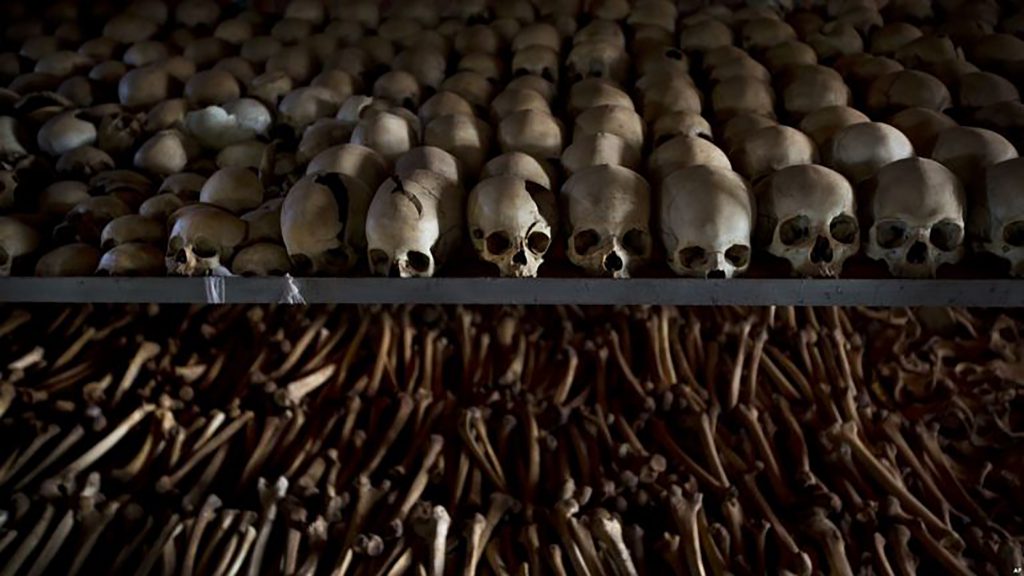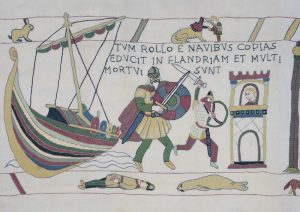In Rwanda there are two ethic groups: the Hutu, which makes up the majority of the population, and the Tutsi, the minority. Tensions between these two groups have been going on for years, so was not surprising that their conflicts would eventually escalate drastically. Despite their differences, they were actually very similar. The two groups have shared the same locations as to where they choose to live, the traditions they follow, and also the language that they speak. At a glance, they look very similar; but Tutsis tend to be taller and slimmer than the Hutus.

Hutu dislike for the Tutsi came about when the Belgians, who once dominated the region of Rwanda, considered the Tutsis to be superior to the Hutus. The Belgians gave the Tutsis better education, and even granted them better jobs than the Hutus. In 1959, a series of riots broke out in Rwanda. Many fled to Burundi, Tanzania, and also to Uganda.1 Unfortunately, 20,000 Tutsis were killed during the riots. In 1962, Belgium relinquished its power over Rwanda, and it was given its independence. The second President of Rwanda, Juvenal Habyarimana, who had been a dictator in power since 1973, and who was also a Hutu, began to lose popularity when the Hutus took over the government and the economy weakened. This is when Paul Kagame, a Tutsi, founded the Rwandan Patriotic Front (RPF) to try and overthrow the president. After much violence, the two sides, the RPF and Habyarimana, signed a peace accord in mid-1993. But on April 6, 1994, the President’s plane was shot down, killing both Habyarimana and the President of Burundi, Cyprien Ntaryamira; and things started to go badly wrong in Rwanda.
After the plane was shot down, the preexisting tensions between the Hutus and the Tutsis quickly flared up. No one knows who shot the plane down, but the Hutus quickly pointed the finger at the Tutsis. Conflict between the two neighboring tribes was nothing new in the central African nation of Rwanda, but the downing of the president’s plane was the final straw for the Hutus. Paul Kagame was accused by the leaderless Hutu government for being responsible for the plane crash and death of Habyarimana.2 Kagame denied this accusation and said that he had nothing to do with it, but news of the death of President Habyarimana spread across the country.
Shortly after the start of Rwanda’s genocide, Rwanda’s government initiated a campaign of retribution, and began to target Tutsis. In just hours, recruits from Hutu groups, government soldiers, and militias were sent to kill the Titus population, a Tutsi-minority tribe living in Rwanda. They were given radios to help them coordinate target groups of people. The recruits were sent into Tutsi cities where they started killing any Tutsi in sight with automatic weapons. For over the one-hundred days, more and more Hutus joined the killing squads, either by force of the government or voluntarily. They started to use machetes, spears, knives, and also masu, which is a thick club with nails sticking out of it. It even got to the point where everyday objects were used.3 They would have screwdrivers, bicycle handle bars, and hammers in one hand, and in the other a radio waiting to hear their next directive. They blew up churches where the Tutsi people were going into hiding to protect themselves, but the churches turned into death sites, trapping those inside when the churches were set on fire. Citizens of the Hutus were even being forced to go and kill the Tutsi people. They were given offers of food and money, and even told that could take the land of a Hutu if they killed them.

American President Bill Clinton did little to stop the massacre, even ignoring the obvious warnings about the killing that would take place after Habyarimana’s plane had crashed.4 Even other countries, like France and Belgium, along with the United States and the United Nations, knew what was about to occur, and wouldn’t take the initiative to try to stop it. For weeks these countries refused to use their moral and political authority to go against the genocidal government of Rwanda. The United States could have done much more to help out a country that was in need. Even a little bit of help would have been something, and maybe a significant number of people wouldn’t have lost their lives. While the American Congress was looking to the President to take action, Clinton was looking to the United Nations to take action. Since nothing was being done, sadly the killing just continued.
The only reason the genocide in Rwanda ended was because of the determination of the RPF. They fought back against the killing squads, and defeated the government’s soldiers. When they took control, Paul Kagame became the Vice President and Minister of Defense. With everything said and done, 800,000 Tutsi men, women, and children were killed from roughly 200,000 participants.5 There were 75,000 children that became orphans. Between 250,000 and 500,000 Tutsi women were raped, resulting in around 20,000 children being born as a result. The HIV virus and AIDS were used as another weapon, with 67% of the women that were raped being infected. If someone would have stepped up before this all unfolded, this would have been prevented and so many people wouldn’t have lost their lives or experience life changing events.
- Samantha Power, A Problem From Hell (New York: Basic Books, 2002) 342-347. ↵
- Samantha Power, A Problem From Hell (New York: Basic Books, 2002) 335-339. ↵
- Encyclopedia of Political Communication, 2008, s.v. “Rwanda Genocide, Role of Media,” by Frank Wittmann. ↵
- Samantha Power, A Problem From Hell (New York: Basic Books, 2002) 353-361. ↵
- Anna-Marie de Beer and Elisabeth Snyman, “Shadows of life, death and survival in the aftermath of the Rwandan Genocide,” Tydskrif vir Letterkunde vol. 52 issue 1 (Autumn 2015): 18. ↵



75 comments
Clarissa Bustamante
This was a very interesting article! I have heard of this genocide but I have never really had much knowledge about it. By reading this article I can say that this genocide was a horrible thing. I don’t understand how people can kill others of their own kind. I have gained a greater understanding of Rwanda’s Genocide due to the article being very informative and well written to where it was easy for readers that know nothing about this topic to be able to understand it.
Gabriela Serrato
This story makes me cringe because of the violence of the massacre. It was hard to read how people were killing others with such objects that honestly make me sick to my stomach. This is a travesty! I am ashamed that nothing more was done to stop the killing of 800,000 people. I am disgusted with the lack of help our country provided. It is obvious that we do not help others unless they are white, or if there is some benefit to us. And this even continues today, where we only send our “prayers” out or send help to those countries where people are white. Even today and our current administration’s lack of help for Puerto Rico is inhumane. We need to do better for every country in need of help. It is vital and what is morally just.
Matthew Rios
This was a well put together article, thank you Troy. The atrocities committed in Rwanda are definitely things history will hopefully never forget. People think these sort of events won’t happen in their lifetime, but ISIS is essentially doing the same to Christians right now in their controlled portions of the region. These crimes against humanity can not, and should not go unanswered. And its perpetuators must be met with a fire and fury by any means necessary.
Abigale Carney
Very interesting article! I have heard about this awful genocide before. It is disgusting that Hutus took over to kill of the Tutsis. It is terrible that the other surrounding governments were not able to step in and help Rwanda, but it was almost too dangerous to intervene in my opinion. I do not understand how the Hutus could kill their friends and neighbors, and I do not understand why this split in culture caused the genocide after cohabitation with each other for a long time.
Crystalrose Quintero
Having read a book in high school about Rwanda I was very excited to read this article. The introduction paragraph jumped straight into describing the two ethnic groups to be discussed; I appreciated that it quickly provided information. The paragraph describing the U.S. president actions was very opinionated and I really enjoyed reading that. Rather then remaining neutral and attempting to give the president a positive e image it explained that the president did not take much action during this violence for Hutus and tutsis.
Alejandra Chavez
I applaud you for being able to be able to have such a well written piece that captures the melancholic essence so accurately. This piece was not only had the necessary personification in order for the reader to connect to what is being read, but also provided a great amount of factual evidence. Although tragic, the topic of this article was very well discussed.
Osman Rodriguez
Good article and great deal of information. I will admit, I got lost a couple times throughout the article. Nonetheless, interesting topic. I never knew about the Rwanda genocide. It irks me that such a terrible event was allowed to unfold by greater governments of the world. It is horrible to see government and people fall into tyranny. This shows how terrible us humans can be to one another.
Cameron Ramirez
The genocide of the Tutsi people in Rwandan is pure evil. Over 500,000 to 1,000,000 people lost there lives during the Rwandan genocide. It is so sad the United States of America did nothing to prevent or even stop the terrible onslaught of the Tutsi people. Not even the United Nations did anything to stop the killings. It is so sad that many countries will only act if only they see a benefit to themselves if they do intervene.
Briana Myers
This is a very sad incident that occurred in history. I had never heard of this incident before reading the article. It is very sad that many people were killed due to something that was not even proved to be their fault. They just took the blame for the plane crash causing thousands of people to be killed. The worst part is the no one tried to do anything to stop it. Not the United Nations or the United States. Thy just let people die without a single care.
Benjamin Voy
I was extremely fascinated by this story, even though it was an awful tragedy. What happened to the Tutsis was nothing short of awful but also for all the Hutus that were forcefully made to kill potentially their friends and neighbours. Both tribes in this nation were the victims of this genocide. This will always be remembered as one of the worst genocides ever. A well written article that captured the sad feeling perfectly